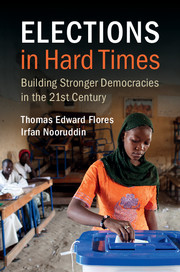Book contents
- Frontmatter
- Dedication
- Epigraph
- Contents
- List of figures
- List of tables
- Preface
- Part I From Elections to Democracy: Theory and Evidence
- 1 Introduction
- 2 Why Have Elections Failed to Deliver? An Answer
- 3 The Third Wave(s) and the Electoral Boom
- Part II Challenges Facing Elections in Developing Countries
- Part III Democracy Promotion for the Twenty-first Century
- Appendix A Data Appendix: Sample, Variables, Sources
- Appendix B Main Statistical Results
- Notes
- Bibliography
- Index
2 - Why Have Elections Failed to Deliver? An Answer
from Part I - From Elections to Democracy: Theory and Evidence
Published online by Cambridge University Press: 05 September 2016
- Frontmatter
- Dedication
- Epigraph
- Contents
- List of figures
- List of tables
- Preface
- Part I From Elections to Democracy: Theory and Evidence
- 1 Introduction
- 2 Why Have Elections Failed to Deliver? An Answer
- 3 The Third Wave(s) and the Electoral Boom
- Part II Challenges Facing Elections in Developing Countries
- Part III Democracy Promotion for the Twenty-first Century
- Appendix A Data Appendix: Sample, Variables, Sources
- Appendix B Main Statistical Results
- Notes
- Bibliography
- Index
Summary
Chapter 1 describes a troubling trend: the democratizing power of elections rapidly deteriorated after the beginning of the electoral boom in the late 1980s. This electoral shortfall is no small cause for concern for political scientists and policymakers. One need look no further than Egypt's troubled recent history for an illustration. Democracy promoters cheered as Egyptians staged mass protests in Tahrir Square in 2011, leading to the overthrow of longtime dictator Hosni Mubarak. Elections followed about fifteen months later, bringing to power a government led by the Muslim Brotherhood's Mohamed Morsi. Yet the democratic momentum quickly reversed. Morsi soon issued a declaration prohibiting challenges to presidential decrees. Liberal groups abandoned the constituent assembly tasked with writing a new constitution, complaining that it intended to enshrine Islamic practice into law. Street protests demanding Morsi's resignation presaged a military coup in 2013, which ousted Morsi from power only one year after his election. A new, far less transparent election in May 2014 installed the architect of that coup, General Abdel Fattah al-Sisi as president, with a suspicious 97 percent of the vote.
Our cross-national evidence and Egypt's troubled post-Tahrir history force us to confront two difficult questions. First, why did elections yield smaller democratic dividends in the 1990s and 2000s? Second, why have some countries reaped the proposed benefits of elections, while others have not?
This chapter offers answers to these questions, beginning with a brief intellectual history of academic thought on democratization. Political scientists long relegated elections to the background of theories of democratic change, viewing them as ancillary to either a broad structural transformation or elite negotiations over the political future. This all changed in the 2000s, as scholars reimagined elections as flash points upon which the political future crucially depended. Advocates of democratization by elections found that repeated elections incubate democratic governance. Other scholars disagreed, however, finding that elections may cause political violence or serve as agents of authoritarian control. Still other scholars split the difference, contending that future democratic change hinges on the integrity of elections. Thus, the last fifteen years have yielded new understandings of how elections promote democracy. Yet many questions remain. A persistent and unfortunate isolation of electoral and structural approaches to understanding political change is the prime culprit.
- Type
- Chapter
- Information
- Elections in Hard TimesBuilding Stronger Democracies in the 21st Century, pp. 26 - 56Publisher: Cambridge University PressPrint publication year: 2016



